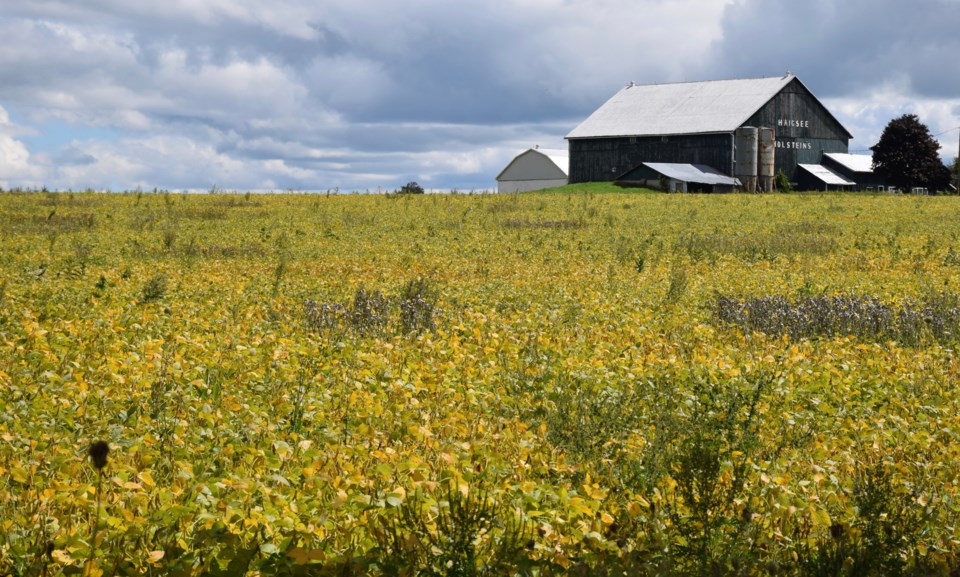Soil is the foundation of Canada’s agriculture system and a key economic driver.
But according to a new report by the Senate Committee on Agriculture and Forestry, climate change, extreme weather events, pollution and urbanization are damaging Canadian soil, and are a threat to food security, and the environment.
Chair of the committee, Senator Rob Black of Fergus, says soil is often overlooked, yet is essential to all life.
“We must act now to preserve this valuable national resource,” Black said.
“Canadian soil was at risk 40 years ago when the senate released its first report on soil health. That’s a long time ago. We don’t have another 40 years.”
A senator for six years, Black began to push for the Senate Committee on Agriculture and Forestry to undertake a soil health study two years ago.
“We had 153 witnesses, 63 hours of testimony and 37 committee meetings. We travelled across Canada and outside the country to look at soil issues and bring back all of the good work that’s being done,” Black said.
“We saw technology outside the country, activities and initiatives. It was a fairly broad and in depth study. On top of that, we received 74 briefs from individuals, organizations and governments, which were also taken into consideration.”
The report highlights concerns from farmers, ranchers, producers and soil health experts about the unprecedented challenges to growing food.
It makes 25 recommendations to the federal government to work with the Canadian agricultural and forestry sectors, as well as municipal, provincial, territorial and Indigenous governments, to tackle soil degradation and preservation aggressively.
The committee says it strongly believes that soil must be a national policy priority to help fight climate change and feed future generations.
“Soil is the basis for agriculture and forestry. Without it, we can’t have those two industries. We would not have plants sequestering and giving us oxygen to breathe,” said Barclay Nap, president of the Wellington Federation of Agriculture.
“Soil does so much for us, and we don’t really realize it. It takes 500-1000 years to make a new inch of topsoil. So, we can’t waste what we got. We really are blessed to have what we have here in Canada.”
Nap said most of this province is very fertile in food and forestry, but it is important to realize much soil has been wasted.
"Some of the best farmland has been paved over. So, it will never be able to feed people again, or filter rainwater, or sequester carbon. We have to take care of what we have left," Nap said.
“We are just scratching the surface. One of the recommendations is to put more funding into a lot of these groups and studies. If we do not take care of our soil and keep polluting, we are going to be in a very difficult place.”
The committee also heard that there is a lack of awareness of the value of soil, and that education is crucial to changing perceptions of farming in Canada.
A team of researchers at the University of Guelph believes there is hope to improve the country’s soil health.
U of G’s Soils at Guelph team helps to advance the latest research about sustainable soil management practices by making the latest findings accessible to farmers, industry and the public. The team’s three co-executive directors, Kari Dunfield, Laura Van Eerd and Claudia Wagner-Riddle, conduct leading soil health research across Ontario.
Along with soil scientists in OAC’s School of Environmental Sciences, they’ve identified science-backed solutions that farmers can incorporate into their production systems to improve soil health.
“There are many options available to farmers to protect soils. The key is finding ones that fit with the farm operation, the cropping system and the soil – that’s the challenge,” said Van Eerd in a recent news release from the University of Guelph.
The Senate report recommends a data-driven and collaborative approach to improving soil health. Van Eerd said the Soils at Guelph team has started a project to build a data-driven scoring system of assessing soil health across Ontario.
“We understand that agricultural soils need to be managed in such a way that they maintain their functions and continue to provide the key services that we rely on. Protecting soils and soil biodiversity are critical for Canada’s ability to meet the 17 Sustainable Development Goals, and address society’s most pressing social, economic and environmental challenges,” Dunfield said.
The Food and Agriculture Organization of the United Nations estimates that 33 per cent of the world’s soil is already degraded and over 90per cent could become degraded by 2050.
According to the Senate Committee on Agriculture and Forestry, a new path forward is needed, one that is based on collaboration between federal, provincial, territorial, municipal, and Indigenous governments to ensure that the economic prosperity of agricultural and forestry producers is at the forefront of soil-related policy.
"We need government to set policies that put soil as a national asset. My biggest fear is that we are going to wake up in this county and realize that one day, we won't have the soil, that we won't have the agricultural land to feed our country. That worries me," Black said.
Black says he hopes that all levels of government stand up and take note.
"Whether it's provincial, territorial, or municipal, I hope this report resonates with all levels of government and Canadians in general," he said.
"This includes you and me, in our own backyards."



